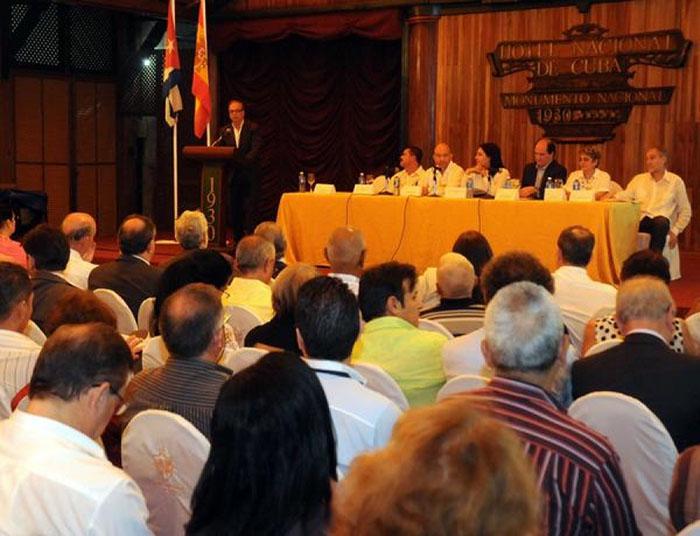Leaders of Cuban enterprises recently interacted with their counterparts from Spain and Hungary, who arrived in Cuba with senior officials interested in investment opportunities on the island, particularly in the Mariel Special Development Zone.

On the occasion of the visit to Cuba by Jaime García-Legaz Ponce, Spanish Secretary of State for Trade, a binational business forum was held in Havana, with the aim of furthering trade ties between the two countries.
In coordination with the Cuban Ministry of Foreign Trade and Investment, the Spanish Chamber of Commerce, the Spanish Confederation of Business Organizations (CEOE) and the Commercial Office of Spain in Cuba, the event was attended by a delegation of 45 Spanish businesspeople mainly from the sectors of energy, construction, hospitality and tourism.
Speaking before the Vice President of theCEOE, Joaquín Gay de Montellá, among other guests, OdalysSeijoo, president a.i. of the Cuban Chamberof Commerce, explained that the investmentstrategy outlinedbyCubarepresentsan opening forSpanishcompanies seekingnew opportunities.
Seijoo proposed that the attending Spanish business owners evaluate new prospects which have emerged in the Cuban economy since the passing of Law No.118 on foreign investment and opportunities offered by the Mariel Special Development Zone.
Speaking to the press, Jaime García-Legaz Ponce stressed the interest of Spanish firms in reinforcing their contribution to the social and economic development of Cuba at a time when unprecedented political steps are being taken.
As an indication of their readiness, Jaime García-Legaz Ponce reported that the Spanish government had developed initiatives to encourage further interest among Spanish companies in the Cuban market.
Among the new legal instruments mentioned were coverage for risks assumed in trading with Cuba, through the Spanish Export Insurance and Credit Company; permission for the public company COFIDES S.A. to finance investment projects on the island; and the decision by the Bank of Spain to relax collateral requirements for loans granted by banks to finance investments.
Regarding Cuba’s aim of potentially increasing the country’s hotel capacity to 30,000 rooms over the coming years, the Spanish Secretary of State for Trade highlighted that Spanish tourism industry already plays an important role on the island and firms such as Meliá, Barceló and Iberostar can further contribute, given the notable experience they have in successfully operating hotels across Cuba.
“Spain has five of the 10 largest construction companies in the world, which are undertaking very ambitious infrastructure projects across the five continents and have a clear desire to increase their presence in the infrastructure that will be developed in the Caribbean nation in coming years.”
Finally, he noted that Spain is a world leader in renewable energy and that the Spanish energy sector has demonstrated interest in this priority area for the island.
The Cuban Neurosciences Center and UltraSmart Ltd signed a memorandum of understanding in the framework of the Third Session of the Cuba-Hungary Business Committee, in the context of the visit of László Szabó, Hungarian First Deputy Minister of Foreign Affairs and Trade.
The agreement, signed in the presence of the Cuban First Deputy Minister of Foreign Trade and Investment, Antonio Luis Carricarte, will enable, among other objectives, the joint manufacture of products related to the development of portable diagnostic and therapeutic devices, for use in primary health care.
The companies Denvair and Medicuba established trade links through two contracts (one framework and one single) for the export of compressors and spare parts.
László Szabó, who attended the meeting along with representatives from eight of the most important companies in Hungary, expressed his satisfaction with the meeting and his desire that relations between the two countries become closer and stronger in the future.
The Third Session of the Cuba-Hungary Business Committee provides continuity for the ties established between Hungarian and Cuban enterprises, which, according to Odalys Seijoo, have grown steadily.
In this period, the Cuban and Hungarian parties have jointly identified new working projects, which have contributed to a better understanding. However, bilateral trade between the two remains modest, with Cuba mainly purchasing insecticides and chemical derivatives, among other products.
This does not reflect the potential that exists between the two countries to further develop bilateral trade, both parties agreed.















